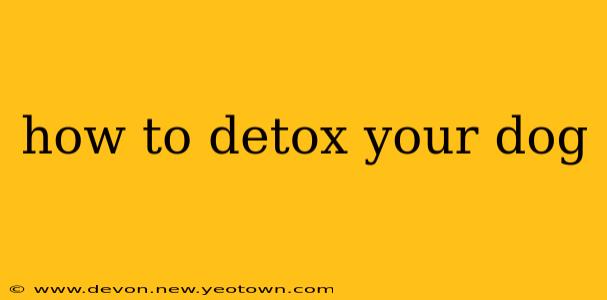How to Detox Your Dog: A Holistic Approach to Canine Wellness
The idea of a "dog detox" might conjure images of complicated concoctions and extreme measures. But the truth is, supporting your dog's natural detoxification processes is more about making gentle, consistent changes than drastic interventions. It's about nourishing their body and supporting its inherent ability to cleanse itself. This isn't about a quick fix, but rather a holistic approach to long-term canine wellness. Think of it as a spring cleaning for your furry friend, focusing on building a healthy foundation.
This journey starts with understanding why you might consider a detox for your dog. Are they experiencing digestive issues? A dull coat? Low energy? Let's explore some common concerns and how to address them naturally.
What are the signs my dog needs a detox?
This is a crucial question, and the answer depends largely on your dog's individual needs and lifestyle. Some common signs that your dog might benefit from a supportive approach to detoxification include:
- Persistent digestive upset: Chronic diarrhea, constipation, or gas can indicate an accumulation of toxins in the digestive system.
- Skin issues: Itching, dry skin, or a dull coat can be linked to internal imbalances.
- Low energy levels: Lethargy and lack of enthusiasm for play can suggest a need for internal cleansing.
- Allergies: Frequent sneezing, itching, or skin rashes may point to an overloaded immune system struggling to process environmental toxins.
- Behavioral changes: Unusual anxiety, irritability, or changes in sleeping patterns can sometimes be linked to toxin buildup.
Remember, these are just potential indicators. If your dog is showing any concerning symptoms, always consult with your veterinarian for proper diagnosis and treatment.
What is the best way to detoxify my dog?
There's no one-size-fits-all answer, but a holistic approach involves several key strategies:
1. High-Quality Diet: This is the cornerstone of any successful canine detox. A diet rich in whole foods, including fruits, vegetables, and lean proteins, provides the essential nutrients your dog needs to support their detoxification processes. Avoid processed foods, fillers, and artificial ingredients. Consider foods with added prebiotics and probiotics to support a healthy gut microbiome—the foundation of effective detoxification.
2. Ample Hydration: Clean, fresh water is crucial for flushing toxins from your dog's system. Ensure your dog always has access to plenty of water, especially during warmer months or after exercise.
3. Regular Exercise: Physical activity supports lymphatic drainage and helps remove waste products from the body. Daily walks and playtime are vital for a healthy detox.
4. Supportive Supplements (Consult Your Vet First): Certain supplements, like milk thistle (known for its liver-supporting properties) or activated charcoal (used to bind toxins in the gut), may be beneficial. However, it's absolutely crucial to consult your veterinarian before introducing any supplements to your dog's diet. They can help determine if a supplement is appropriate and recommend the correct dosage. Incorrect dosage or inappropriate supplements can be harmful.
5. Minimizing Toxin Exposure: Reduce exposure to pesticides, herbicides, and other environmental toxins. Choose natural cleaning products for your home and avoid using harsh chemicals around your dog.
Can I use detoxifying shampoos or baths?
While detoxifying shampoos and baths can help cleanse your dog's skin and coat, they won't address underlying internal issues. They can be a helpful addition to a holistic approach but shouldn't replace the focus on diet, exercise, and hydration.
What are some home remedies for detoxifying my dog?
Some home remedies, like adding small amounts of certain fruits and vegetables to your dog's food (always in moderation and under veterinary guidance), can support overall health. However, remember that home remedies are not a substitute for veterinary care.
Ultimately, supporting your dog's detoxification relies on a combination of factors—a focus on high-quality nutrition, minimizing exposure to harmful substances, and providing plenty of exercise. Remember to consult your veterinarian for personalized guidance, especially if your dog exhibits any concerning health issues. They can help you create a safe and effective plan tailored to your dog's specific needs.

